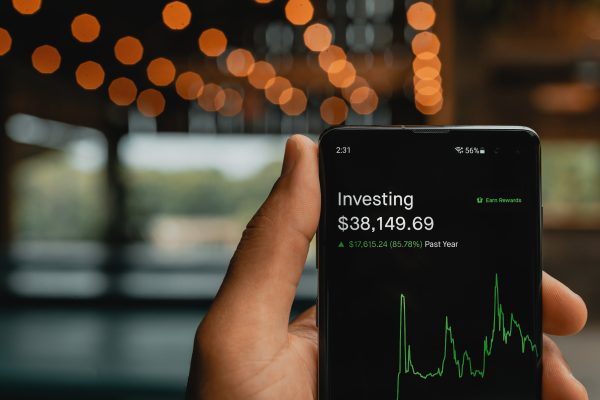
Stock Market Rally: What does it mean for your portfolio?
21 July 2023 6 min read

7 min read
Published:
Updated:

Ibrahim Khan
Co-founder
There have been some crazy IPOs this year – Coinbase, Airbnb and Deliveroo are some famous recent examples and a lot of people have made serious money out of them. But how do they actually work, how can you get exposure to IPOs, and are there any sharia issues to watch out for? And what about all this stuff you’ve been reading in the news about SPACs?
We dig into all this and more in this article.
An initial public offering (IPO) is when a privately listed company lists its shares on a stock exchange allowing the public to purchase them.
The company decides how many shares they want to sell and enlists an underwriter (usually an investment bank) to sort out the rest. The investment bank is responsible for setting the IPO price and drumming up interest from investors. They will also agree to buy any excess shares not taken up by new investors.
In short, it depends on a number of factors and there are plenty of pitfalls to watch out for.
If you want to get into an IPO chasing a big return because you believe you are getting in ahead of everyone else – think again. The private investors who were there pre-IPO are the ones that are likely to be making the big returns. Moreover if you weren’t able to invest at the IPO price (which is typically reserved for large institutional investors), you may already be paying a significant premium on day 1. More on this later.
Granted, many companies continue to grow and enjoy exceptional returns post IPO. Heavyweights such as Amazon and Apple can attest to that.
Conversely companies such as Lyft have enjoyed a blockbuster IPO, faded quickly and are yet to reach those highs again. In Lyft’s case, their shares rocketed to $88 on their IPO day in 2019. 2 years later, they have yet to return to that high, languishing as low as $21 a share. So beware the hype and make sure to assess whether the valuation is reasonable.
You typically have less information available than companies with years of performance records on the stock market. Therefore it is crucial to maximise the information that is available, starting with the prospectus. The prospectus will have useful information summarising the risks and opportunities for the firm. It will also detail the company’s plans for the money raised from the IPO. Red flags include raising money because they can’t cover their expenses and can’t raise anymore from private investors. Encouraging reasons for raising funds include product development or to help expand into new markets.
Don’t be put off just because early investors want to sell to capitalise on their returns. These investors typically take on huge risk investing in unproven businesses early on and it is pretty normal for them to lock in some profits. Be wary if you see everyone jumping ship though. You should expect early investors to retain some skin in the game if they continue to believe in the companies’ prospects.
Companies that go public tend to have a lockup period – a set amount of time in which existing shareholders are unable to sell their shares. Waiting until after this lockup period expires could be a smart strategy. This will allow you to see what the insiders are thinking. If they continue to hold post the lockup, this could be a strong vote of confidence in the company’s future. Alternatively if a disproportionately large number of insiders start selling after the lockup, your alarm bells should be ringing.
You’ve done your due diligence. You are confident in the company’s future prospects and think there is plenty of growth that has not already been priced in.
You have either managed to get in at the IPO price alongside the big hitters, or you have waited until after the lockup period and are happy with the insider action. Or you simply have a long term horizon and are not overly concerned with the short term price movements.
In this section we will cover the various ways in which you can invest into IPOs.
Some companies offer stock options to their employees as part of their overall compensation package. Sometimes this is at the expense of a lower salary or it may just be an additional perk that you could opt in to. These options give you the right to buy a set number of shares at a pre-agreed price. You typically only have a certain period in which you can exercise these options before they expire. If you genuinely believe your company is going places, this could be a be a pretty sweet deal.
Become a startup investor and get in well before the crowd. There are a number of ways in which you can do this:
You can invest immediately into IPOs through the primary market. The primary market is where the company directly sells the shares to investors. This has traditionally only been available to big institutional investors. Here they can subscribe (register their interest) to an IPO. The underwriter will then allocate a number of shares which can then be purchased at the IPO price.
A great recent development is the advent of services such as PrimaryBid. This is an app that allows the everyday investor a chance to subscribe to an IPO and purchase shares at the same time and price as the big institutional investors.
Once the IPO has completed, the shares will be available for the public to invest the usual way through their brokerages. It is common for the post IPO price on day 1 to exceed the IPO price if there is enough demand. So you could be paying a premium.
This is what happened in the Airbnb IPO in 2020. Their IPO share price was $68 apiece, yet when they landed on the market the next day, they rocketed to $146. An eyewatering premium to pay for being a day late.
First and foremost, you need to ensure that the company is halal. This entails ensuring that their core business activities and their finances are sharia compliant.
We have published a number of resources to help you do this. As a starting place here is our stock screening article. We also have a halal stock screener course that goes into more detail and breaks down each step of the process.
Many traders flock to IPOs in order to day trade them for a quick profit. Day trading is a complicated topic. The central issue is whether you are buying and selling without ownership. That aside, it is also a risky endeavour given that most day traders fail. We suggest that you should avoid day trading if you can. For a more detailed discussion of the topic check out our article here and also this fatwa discussion on our forum.
You should avoid investing via anything other than straight up stocks. For example this means avoiding instruments such as warrants, options, derivatives etc. Unless you really know what you’re doing and have studied the fiqh properly and sought scholarly opinion, we would advise avoiding any exotic instruments other than stocks.
Special Purpose Acquisition Companies (SPACs) were all the rage in 2020. They are shell-like entities that go public in order to raise cash for acquisition of private companies. Private companies can then combine with a SPAC as an alternative route to the traditional IPO process.
This unconventional approach though gives rise to a number of additional shariah issues. These issues centre around the uncertainty of the proposed merger with the target company, as well as trading an entity that is typically cash only for long periods of times. For a deep dive, here is an article we did a short while ago co-authored by Mufti Faraz.
One thing to be mindful of is that sometimes direct listings are characterised as IPOs. A direct listing is when the private company directly lists on a stock exchange and set a reference price for the first day.
This is a cheaper way of going to market as you don’t have to pay underwriter fees. It also allows equal access to all investors. Although the trade-off is that they are more unpredictable compared to IPOs where the underwriters will usually have a good idea of what to expect. Prominent recent examples of companies choosing to directly list includes the likes of Coinbase and Spotify.
In summary, IPOs can be a great investment but you have to be careful of the hype – many fail. They should form part of a diversified investment portfolio and doing your due diligence is crucial.
Check out our halal investment comparison engine and our 101 guides to learn more about other areas of investing.

21 July 2023 6 min read

15 February 2023 7 min read

10 January 2023 11 min read